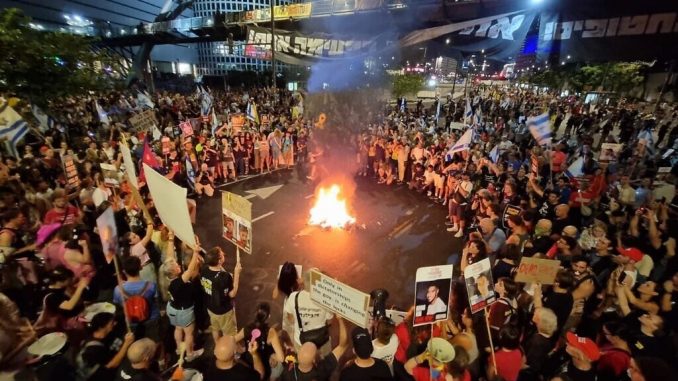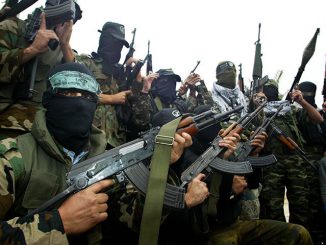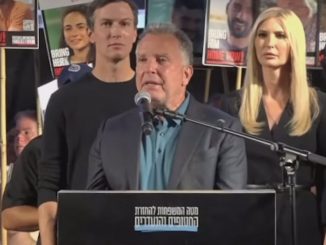
Protesters light a bonfire on Tel Aviv’s Begin Road as they call for the release of Hamas-held hostages in Gaza, August 16, 2025. (Aviv Hassidov / Pro-Democracy Protest Movement)
| Published August 17, 2025
At rallies, families of hostages urge all Israelis to join tomorrow’s nationwide strike * Itzik Horn says planned Gaza City operation would be death sentence for his hostage son Eitan
Netanyahu’s Position: No War-End Without Full Compliance
Prime Minister Benjamin Netanyahu has drawn a clear and uncompromising line: the war in Gaza will not end unless all hostages are freed at once and every one of Israel’s conditions is met. He has dismissed proposals for phased or partial deals, including recent international suggestions that could have secured the release of women, elderly, and wounded captives in exchange for a temporary ceasefire.
Netanyahu insists that anything short of a comprehensive agreement would play into Hamas’s hands, allowing the group to regroup militarily while holding onto leverage. His office reiterated that Israel’s demands extend beyond the hostages themselves. These include the disarmament of Hamas, demilitarization of Gaza, Israeli control of security perimeters, and the establishment of a governing authority free from both Hamas and the Palestinian Authority. In other words, Netanyahu envisions not just a ceasefire, but a fundamental restructuring of Gaza’s political and security landscape.
To Netanyahu’s critics, this approach risks prolonging the conflict, straining relations with allies, and endangering hostages who might otherwise be freed under interim arrangements. But to his supporters, the stance represents a necessary demonstration of resolve, ensuring that Israel emerges from the war with both its deterrence and its security red lines intact.
People rallied on the eve of a national strike in Israel.
Thousands rallied in Tel Aviv calling for the release of the hostages and an end to the war.AP
Hamas has expressed willingness for a partial cease-fire deal in Gaza for the first time this week.
Israeli fighter jets struck a Hezbollah facility and a tunnel in Lebannon Friday.
Qassem threatened there will be “no life in Lebanon” if Hezbollah is disarmed.
 Implications
Implications
Here are the main implications of Netanyahu’s insistence on an “all-or-nothing” deal:
🔹 Diplomatic Implications
-
Talks may stall: Since Hamas favors a phased release, Netanyahu’s rejection of partial deals reduces flexibility, making it harder for mediators (U.S., Egypt, Qatar) to broker progress.
-
Strained U.S.-Israel relations: Washington has signaled openness to phased approaches to avoid escalation, so Netanyahu’s stance could create friction with allies.
-
Regional alignment shifts: Arab states seeking de-escalation (Egypt, Jordan, Gulf states) may see Israel as escalating unnecessarily, complicating normalization efforts.
🔹 Military Implications
-
Higher chance of a Gaza City offensive: By setting maximalist terms, Netanyahu essentially sets the stage for renewed large-scale operations if Hamas doesn’t comply.
-
Hostage risks increase: Rejecting partial releases could prolong captivity for Israelis, potentially leading to more deaths before any deal materializes.
-
Escalation across the region: Hezbollah or Iran-backed groups might increase attacks if Gaza war drags on, expanding conflict beyond one front.
🔹 Humanitarian Implications
-
Prolonged suffering in Gaza: The all-or-nothing demand delays ceasefire opportunities, meaning more civilian casualties, displacement, and infrastructure collapse.
-
Pressure on aid groups: With fighting likely continuing, humanitarian agencies will struggle to deliver food, medicine, and shelter.
🔹 Domestic Political Implications (Israel)
-
Netanyahu shoring up hardline support: His stance appeals to right-wing partners who oppose concessions, helping him maintain his coalition.
-
Public opinion split: Families of hostages may grow increasingly frustrated, as they would prefer phased deals that save lives sooner.
-
Personal political survival: By linking his leadership to a decisive “victory,” Netanyahu avoids appearing weak—but risks backlash if hostages die.
🔹 Long-Term Strategic Implications
-
Future of Gaza governance: Netanyahu’s demands for a non-Hamas, non-PA authority raise the question of who governs Gaza next—an unresolved issue that could lead to a power vacuum.
-
Erosion of trust in negotiations: If partial deals are consistently dismissed, mediators and adversaries alike may see Israel as inflexible, weakening future bargaining credibility.
-
Conflict cycle continuation: Without compromise, the war risks becoming a drawn-out insurgency rather than reaching a definitive resolution.
 Overall Takeaway:
Overall Takeaway:
Netanyahu’s insistence on a comprehensive, all-in-one hostage deal underscores his determination to portray the war as not merely a military campaign, but a struggle over Israel’s long-term security and political future. By rejecting partial agreements, he signals resolve—but at the cost of diplomacy, humanitarian relief, and possibly the lives of some hostages still in captivity. The coming weeks will test whether this hardline strategy forces Hamas into submission or deepens the deadlock, prolonging the suffering of civilians on both sides. What is clear is that any end to the war hinges not just on battlefield outcomes, but on whether uncompromising demands can be reconciled with the urgent realities of diplomacy and human survival.
SOURCES: THE TIMES OF ISRAEL – Netanyahu insists on comprehensive deal for all hostages; won’t end war unless all his demands met
THE NEW YORK POST – Netanyahu says Gaza City will be sacked unless Hamas agrees to all of Israel’s demands
AP NEWS – Netanyahu hints that Gaza ceasefire talks now focus on the release of all hostages at once











Be the first to comment